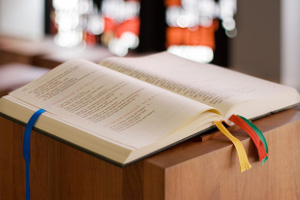 “Curds and honey” (v. 15) is the produce of the wilderness and the food of nomads. You do not need to work the land for them as you do for bread, wine and oil.
“Curds and honey” (v. 15) is the produce of the wilderness and the food of nomads. You do not need to work the land for them as you do for bread, wine and oil.
The question is whether ‘curds and honey’ is good news or bad news. This is the ambiguity the whole passage is infused with.
Surely, God giving a sign of a child called Immanuel (God with us) is good news? But Ahaz does not want a sign and a “deserted land” (v.16) although in keeping with the ‘curds and honey’ (see also v.22) is not good news. This is typically one of those texts from the Hebrew Bible that is hard to understand because it seems as if different voices (maybe from different times) want to speak in the same text.
This is the case even before Matthew claimed this text for Jesus and Christianity claimed it for Advent. The contradictions in the text speak to me: God with us is both good and bad news. It is both wonderful and very difficult. God with us is like the wilderness: the best thing and the scariest thing that can happen. In the words of St John of the Cross ‘God’s brightness is a dark night’ for human beings. Endlessly good and unexplainably difficult: just as waiting for Christmas is both a delighted expecting and a painful longing.
18 December 2016
Isaiah 7:10-16
This weekly blog on one of the lectionary readings is by Anna-Claar Thomasson-Rosingh, Coordinator for the Centre for Encountering the Bible and Director of Studies for the Centre for Formation in Ministry.

Leave a Reply